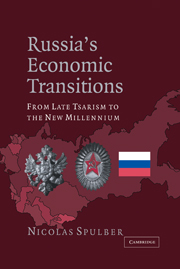Book contents
- Frontmatter
- Contents
- Figures and Tables
- Preface
- PART I THE TSARIST ECONOMIC TRANSITION
- PART II THE SOVIET ECONOMIC TRANSITION
- 10 The Socioeconomic Framework
- 11 The Transition Issues
- 12 The Economic Policies
- 13 The Problems of Agriculture
- 14 The Industrial Changes
- 15 Domestic and Foreign Trade
- 16 Money and Banking
- 17 State Finance
- 18 Overall View
- PART III THE POST-SOVIET ECONOMIC TRANSITION
- Index
11 - The Transition Issues
Published online by Cambridge University Press: 03 December 2009
- Frontmatter
- Contents
- Figures and Tables
- Preface
- PART I THE TSARIST ECONOMIC TRANSITION
- PART II THE SOVIET ECONOMIC TRANSITION
- 10 The Socioeconomic Framework
- 11 The Transition Issues
- 12 The Economic Policies
- 13 The Problems of Agriculture
- 14 The Industrial Changes
- 15 Domestic and Foreign Trade
- 16 Money and Banking
- 17 State Finance
- 18 Overall View
- PART III THE POST-SOVIET ECONOMIC TRANSITION
- Index
Summary
Principles of Action
What were the principles and rules of organization of the Soviet state from its inception? What were the concepts on the basis of which the economy was supposed to be reorganized and managed in order to transit toward “socialism”? How were production and distribution to be carried out, money and credit handled, wages and prices determined? To what extent would such changes reflect unalterable commitments to Marxian theories? Yet, why were some of the early principles eventually set aside, and then, later, reinstated as the guiding principles of the Soviet state?
The policies in question concerning notably the alleged transition from capitalism to communism, the dictatorship of the proletariat, and the specific pattern of organization of the socialist state and the economy that became central to Lenin's views and then to Soviet practice had been first enunciated by Karl Marx and Friedrich Engels, and then by certain German socialist theoreticians such as Karl Kautsky. Marx and Engels asserted in the Communist Manifesto of 1848 that the first steps in the communist revolution were “to raise the proletariat to the position of the ruling class.” The proletariat would then use its political supremacy to “wrest” all capital from the bourgeoisie and to “centralize all instruments of production in the hands of the state,” abolish private property on land, centralize credit and the means of transport and communications, and combine agriculture with manufacturing industry, gradually abolishing “the distinction between town and country.”
- Type
- Chapter
- Information
- Russia's Economic TransitionsFrom Late Tsarism to the New Millennium, pp. 174 - 191Publisher: Cambridge University PressPrint publication year: 2003



